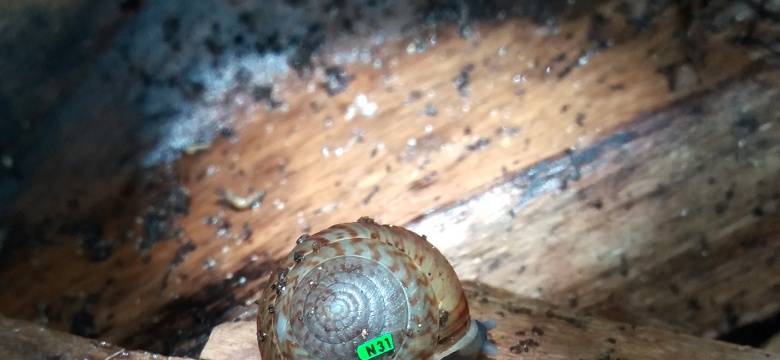4000 Endemic Bermuda Land Snails Repatriated to Bermuda

This month, the Department of Environment and Natural Resources (DENR) successfully repatriated 4000 endemic Bermuda land snails to Bermuda.
The snails (Poecilozonites bermudensis) are currently being tagged and will then be released on Nonsuch Island and another, privately-owned island, as part of a monitoring project that will study how well the population fares post-release.
The snails came from a joint breeding effort by the Zoological Society of London and the Chester Zoo. The endemic land snails were sent to the Zoological Society of London shortly after their rediscovery in 2014. The captive breeding efforts at the Zoological Society of London produced so many snails — thousands — that they gave some to the Chester Zoo.
Poecilozonites bermudensis was thought to be extinct until the species was rediscovered in a Hamilton alley in 2014. Prior to that, the last recorded sighting of this endemic land snail was made in the early 1970s by the well-known paleontologist and Harvard professor Stephen J Gould.
"These offspring came from the relict population found in Hamilton back in 2014," explained the Department's Wildlife Ecologist Dr. Mark Outerbridge. "Releasing them back into their natural habitat is part of the on-going recovery of this critically endangered species."
This species is unique to Bermuda and is part of an ancient lineage of land snail that dates back in time over one million years. Historically described as being extremely abundant on Bermuda, the island-wide population experienced a dramatic decline during the 20th century because of predation from introduced carnivorous snails and terrestrial flatworms.
“Only a handful of residents have actually seen a living endemic land snail,” said Dr. Outerbridge. “However, their fossilized shells are commonly found embedded in the rocks along south shore. I don’t expect they will ever be as numerous as they once were, but hopefully this species will get a new lease on life once it becomes established on the island nature reserves.”
Surveys undertaken by DENR and a core team of volunteers indicate that both islands have snail-friendly habitats and no evidence was found of the main predators that nearly caused their extinction.
In 2016, a limited number of endemic land snails were released and monitored on Nonsuch Island to see how they managed. Breeding and range expansion were observed over the years that followed. This gave the team confidence to make the decision to release a much larger number of captive-bred snails.
The snails will continue to be monitored at both reintroduction locations and additional islands will be identified for future releases.